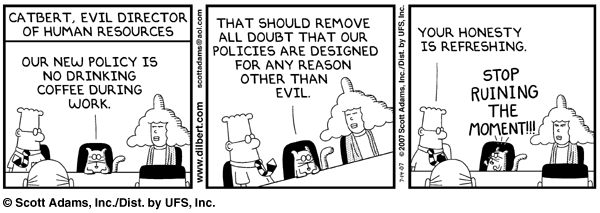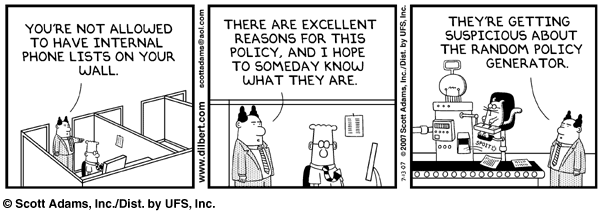July 17, 2007
Still in the Catbert seat?
A couple of days ago, in a post on "Weird logic and Bayesian semantics", I wanted a good example to show that sentences with multiple negations and modals, though hard to process, often turn out to mean exactly what the author intended. I settled on the quotation "That should remove all doubt that our policies are designed for any reason other than evil", from the middle panel of a recent Dilbert cartoon.
I felt that Catbert meant that the policies clearly have no purpose other than evil; and on reflection, I felt that what he said meant what he wanted it to mean.
But perhaps my evaluation was wrong.
Take a look at the strip and see what you think:

Yesterday, Robert Corr wrote from Australia to disagree with my interpretation:
I came to the opposite conclusion. I broke the sentence into its two parts, worked out what each part meant, and put them back together. So:
"That should remove all doubt that..." => "It is certain that"
"...our policies are designed for any reason other than evil." => "...our policies are not designed for evil."So I think Catbert got it wrong.
I appreciate Mr. Corr's reasoning, but I believe that he is confused by "any", which normally needs to be in the scope of a negation (or question). Thus when he split the sentence, he imagined an extra negation governing "any" in the second half -- or interpreted any in the "free choice" sense that would here combine with other than to the same effect -- and thereby put Catbert inappropriately in the wrong.
So I took the matter to a higher court -- Larry Horn, author of A Natural History of Negation -- and got this ruling:
I think she (Catbert looks like a she, anyway) gets to stay in the Catbert seat. Granted, the sentence would be easier to process if the second half were easier to parse:
"That should remove all doubt that anyone left early" = 'Clearly, no one left early'
"That should remove all doubt that I drank any of the scotch" = 'Clearly, I didn't drink any of the scotch'So I agree with you that the "any" is probably messing things up for Mr. Corr, and that Catbert is indeed claiming--as presumably intended--that it is clear that "our policies are not designed for any reason other than evil", which amounts to an admission that our policies are designed for no reason other than evil.
The tricky thing here is that we get into the semantics of exclusive propositions, which as everyone since Peter of Spain, William of Sherwood, and Ockham recognized is not always a safe place to hang out. In particular, it could be that our policies are designed for no reason other than evil without being designed for evil, although that does violate a conversational implicature at the very least. Just as I can swear "I love no one other than you" even if I don't love you either -- so too perhaps the company's policies are designed for no reason whatsoever.
Thus, pace Dilbert, Catbert may not be quite as refreshingly honest as she may (eventually) appear.
This solomonic opinion appears to support my argument about the sentence, while at the same time it opens the door to Mr. Corr's conclusion about the policies. Indeed, in my limited experience of corporate life, "no reason whatsoever" often fits better as an policy justification than "evil" does. And in fact, Scott Adams appears to agree, based on this strip from a few days earlier:

So perhaps Catbert's aim, after all, was to hide absurdity behind a false veneer of malevolence. If so, I should have chosen a different example; but in the end, this one serves my purpose, since the point was that such sentences are difficult to process, but their interpretation is not consistently backwards, unlike "cannot be underestimated", "difficult to underestimate", and the like.
[Update -- Jeffrey Kallberg writes:
Doesn't the ambiguity in the second clause of Catbert's statement lie in the placement of "other"? If we change "our policies are designed for any reason other than evil" to "our policies are designed for any other reason than evil" then the sense seems clear. Maybe . . .
Does this editorial change remove all doubt that the sentence is subject to any other interpretation than the one I first attributed to it? Perhaps, but I believe that I've now fatigued certain key brain cells to the point that I find it difficult to underestimate the likelihood of any interpretation for such sentences. I'll try again after lunch.]
[Well, I've had lunch, and things aren't getting any clearer. Brian Decker writes:
I have a slightly different take: I think the word doubt is partly to blame here. Typically doubt, at least as a noun, is followed by the condition that is postulated to be true but which the subject is uncertain about (as opposed to the content of the doubt itself, which is the uncertainty in the condition postulated to be true).
I have a doubt that the shirt is red = You say the shirt is red, but I doubt that and think it is not red, not You say the shirt is not red, but I believe it may be in fact red.
Removing the doubt typically thus converts the condition back to certain.
That should remove all doubt that the shirt is red = The shirt is certainly established as red, not You can no longer believe that the shirt is red, because that doubt has been removed.
Introducing any into the object doubted usually doesn't change this, which means the object remains something postulated to be true that the subject is uncertain about.
I have a doubt that the shirt is any color other than green = You say the shirt is not green, but I doubt that and think it is green , not You say the shirt is green, but I believe it may in fact be some other color.
You would expect (and Mr. Corr did), consistent with above, that removing the doubt would convert the condition back to certain. But that's where the issue is: does the object of the doubt suddenly flip and become the uncertainty in the condition postulated to be true, rather than the condition itself?
That should remove all doubt that the shirt is any color other than green = either The shirt is certainly established as some other color or The shirt is certainly established as green.
The former would be more consistent with what happened we we removed all doubt that the shirt was red, but it doesn't sound right. I think that when you remove a doubt whose object is something involving any, it's as if the doubt's object switches to become a description of the uncertainty rather than a description of what somebody postulated to be true that is now doubted.
Ran Ari-Gur writes:
In your post "Still in the Catbert seat?", you say that Mr. Corr was confused by the presence of "any" in the latter part of the sentence, and point out that "any" "normally needs to be in the scope of a negation (or question)."
Firstly, it's odd to me that "doubt that ___" can license an negative polarity item when introduced by "remove all"; for me, "remove all doubt that" is a strict formula, and a positive one. As a result, Catbert's utterance sounds ungrammatical to me.
But secondly, even if we break things up differently, I agree with Mr. Corr's interpretation. If claim X is "[the company's] policies are designed for [some] reason other than evil," then a "doubt that [X]" would be a belief that they might well be designed only for evil (or for no reason at all), and to remove that doubt would be to remove that belief - i.e., to reassure that they are definitely designed for some reason other than evil.
You could get the opposite interpretation if you take a "doubt that [X]" to be a "suspicion that [X]" (i.e., a "belief that perhaps [X]"); but that's not its usual sense in the formula "remove all doubt that", and I doubt it's what Catbert can mean (though it would explain why (s)he felt it could license an NPI).
And Matt Berends writes:
I think you and Robert Corr are both right. It seems that the sentence "that should remove all doubt that our policies are designed for any reason other than evil" is ambiguous between it is certain that our policies are designed for some reason other than evil (Robert Corr's interpretation) and the policies clearly have no purpose other than evil\(yours). However, I don't think the ambiguity turns on NPI "any" or the position of "other". Rather, I think the sentence simply means something like "it is not uncertain whether our policies are designed for anything other than evil", or in other words all matters regarding the design of the policies are settled -- settled because the policies *are* designed for only evil, or perhaps because they're used for good, too. I'm probably on the wrong track, but I thought it was worth a shot.
At this point, I'm beginning to feel the need to call in some formal logic, though perhaps it's too late.
In any case, I'm sure that Samuel Beckett is enjoying this immensely, as he looks on from an outdoor table at some celestrial bistro. Here we are, a half a dozen intelligent and highly trained lawyers and linguists and whatnot, and we can't get to a consensus on whether a cartoon character's sentence can be construed to express what (s)he apparently meant it to say about doubt, evil and the randomness of organizational policy. ]
[Tom Recht adds a fine scholarly note:
When I first read your Catbert multiple-negation post I agreed with your judgement that the sentence does say what it means, both at first glance and after logical calculation. But the logic of your correspondents' dissenting opinions seems equally robust. I think what's going on is that "doubt" has two meanings: most commonly it means "suspicion that something is not the case", but it can also mean simply "suspicion or apprehension" (i.e., that something IS the case). The second meaning is rare these days, but it's found in Shakespeare:
'Tis a shrewd doubt, though it be but a dream. (Othello)
KING Methinks the power that Edward hath in field
Should not be able to encounter mine.
EXETER The doubt is that he will seduce the rest. (Henry VI)SERVANT What, think you then the king shall be deposed?
GARDENER Depress'd he is already, and deposed
'Tis doubt he will be (Richard II)Under this interpretation Catbert's statement works fine: "remove all suspicion that our policies are designed for any reason other than evil" = "our policies are certainly designed for evil". Who ever doubted that Catbert was an Elizabethan?
Not me. As the Clown says in All's Well that Ends Well, in reference to Parolles:
Heere is a purre of Fortunes sir, or of Fortunes Cat, but not a Muscat, that ha's falne into the vncleane fish-pond of ambiguity, and as he sayes is muddied withall.
(OK, he didn't, but he might have.) ]
Posted by Mark Liberman at July 17, 2007 07:15 AM